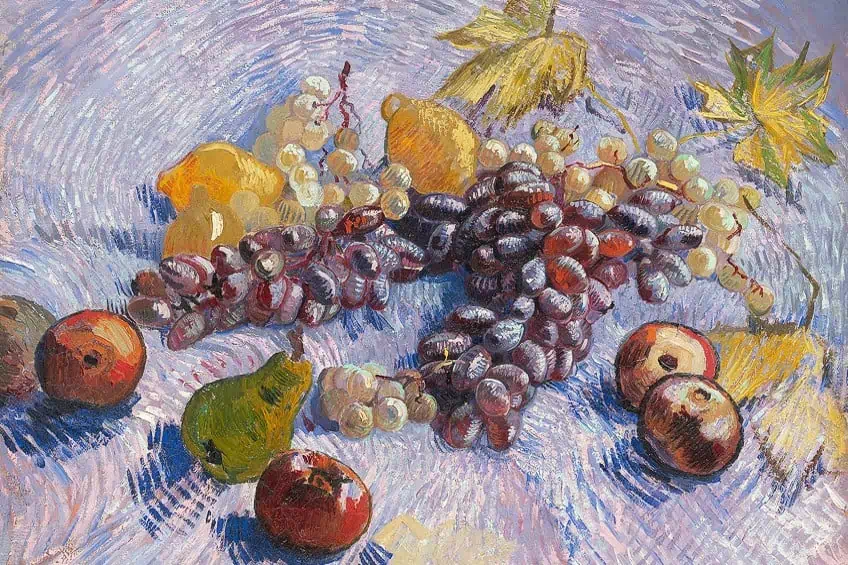Famous Fruit Paintings – Take a Look at the Best Paintings of Fruit
Throughout the centuries, artworks representing natural objects, such as paintings of fruit, have been a popular subject for artists. When compared to other objects often used in still-life paintings, fruit can offer a feeling of vibrancy and life. Let us learn more about well-known paintings of fruit by examining the most famous fruit paintings ever produced.
The Most Famous Fruit Paintings Ever Produced
Due to their unique coloring and diverse shapes, fruit is frequently utilized in still-life works of art. Famous painters from many different art movements and styles have based their most well-recognized paintings on various types of fruit. Even famous artists such as Vincent van Gogh and Paul Cézanne have produced paintings of fruit.
Vertumnus (1591) by Giuseppe Arcimboldo
| Artist | Giuseppe Arcimboldo (1526 – 1593) |
| Date Completed | 1591 |
| Medium | Oil on panel |
| Current Location | Skokloster Castle, Sweden |
This delectable little vegetable smorgasbord of a person exemplifies Arcimboldo’s unique, yet very strange, style. Arcimboldo, like the other Renaissance artists who preceded him, was attracted to natural sciences. Arcimboldo, like Da Vinci, had a deep fascination with biology and incorporated it into his paintings. Like Albrecht Dürer, he valued natural aspects, which influenced how and what he produced.
Fortunately, this renowned eccentric artist found clientele who trusted him enough to let him embrace his wild side and produce some of the most daring portraitures of his era.
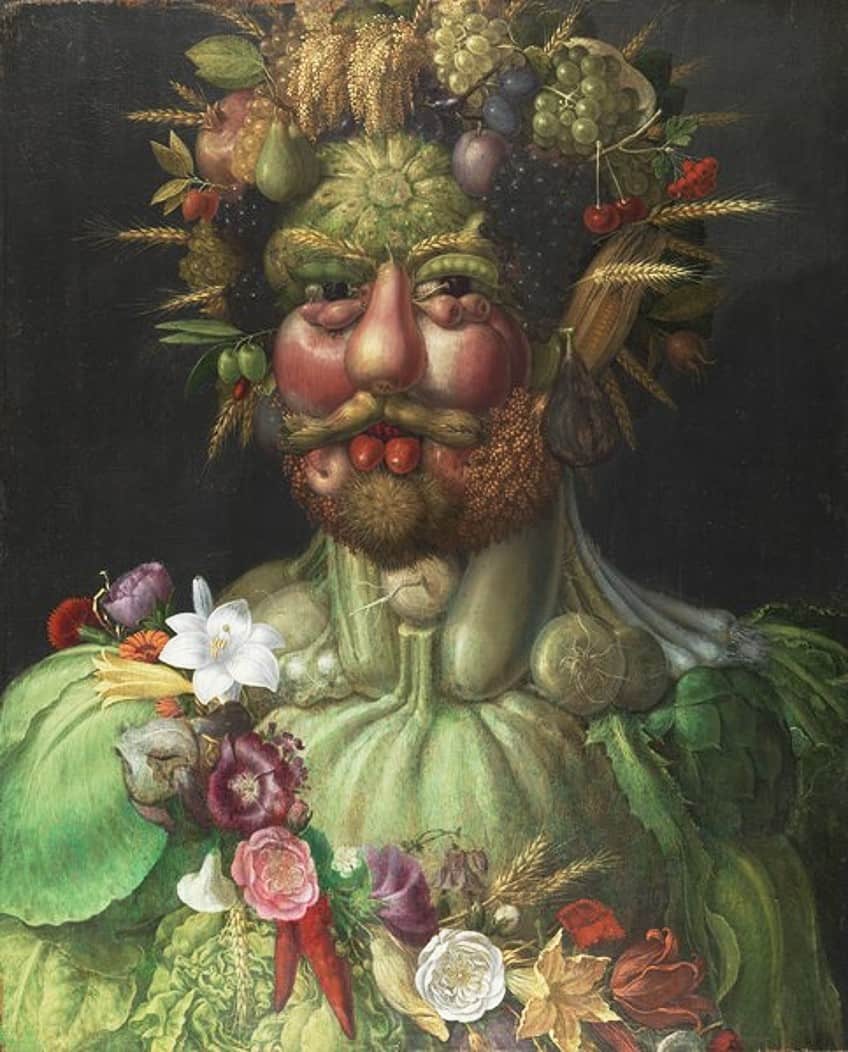
Arcimboldo represented Rudolf II as Vertumnus, by constructing the emperor’s visage out of various vegetables and fruits. Vertumnus, being a deity of all seasons, signifies longevity, and so did it too signify the duration of Rudolf’s reign. Additionally, by being shown as this deity of creation, Rudolf’s influence appears to stretch not just to his domain and citizens, but also to the natural order itself.
The profusion of flowers and fruits implies that the empire will prosper under Rudolf’s leadership.
Still Life with a Basket of Fruit (1596) by Caravaggio
| Artist | Michelangelo Merisi da Caravaggio (1571 – 1610) |
| Date Completed | 1599 |
| Medium | Oil on canvas |
| Current Location | Biblioteca Ambrosiana, Milan, Italy |
This is Caravaggio’s sole still life that has survived and been positively attributed. North Italians were used to delicate and reverent renderings of crystal, fruit, linen, and so forth, but it wasn’t until about the period of Caravaggio’s birth that a few Lombard painters began to depict still life unconnected to humans. Caravaggio followed in their footsteps.
His talent as a still-life artist was acknowledged, and he was largely responsible for the genre’s popularity among Italian artists during and after his lifetime.
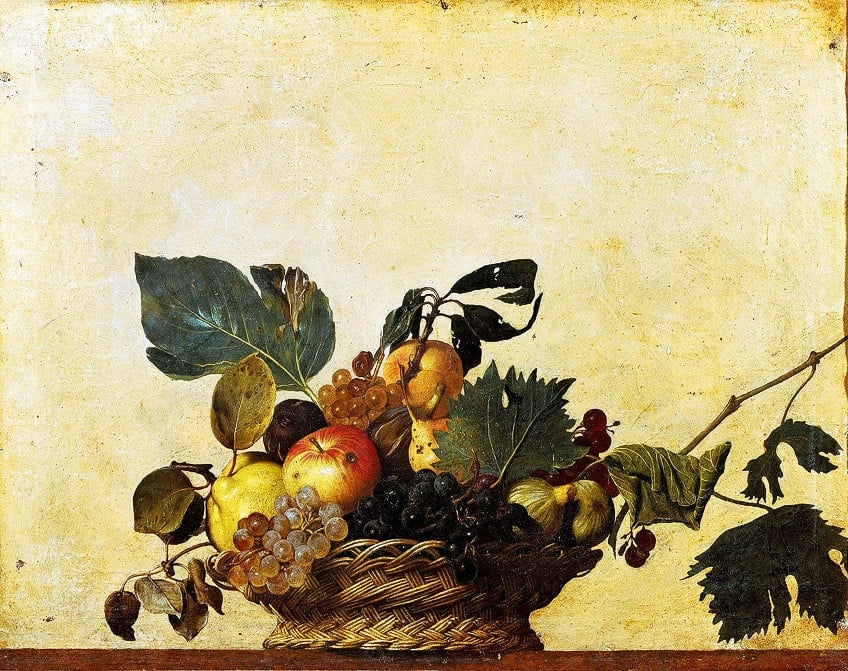
The components are represented straightforwardly, with no obvious mannerism style apparent. They are asymmetrical and appear to be stacked up haphazardly, but in reality, they have been organized as meticulously as an architectural edifice.
Still Life with Lemons, Oranges and a Rose (1633) by Francisco de Zurbaran
| Artist | Francisco de Zurbaran (1598 – 1664) |
| Date Completed | 1633 |
| Medium | Oil on canvas |
| Current Location | Norton Simon Museum, California, United States |
Although Francisco de Zurbarán is best known as a creator of religious themes, this still life marks a watershed moment in both the artist’s career and the development of the genre. Apart from its elegance, it is Zurbarán’s sole dated and signed still life.
A basket loaded with oranges and adorned with orange flowers sits on a brown table against a velvety black backdrop; on the right, a shiny silver dish holds a cup containing water and a pink rose.
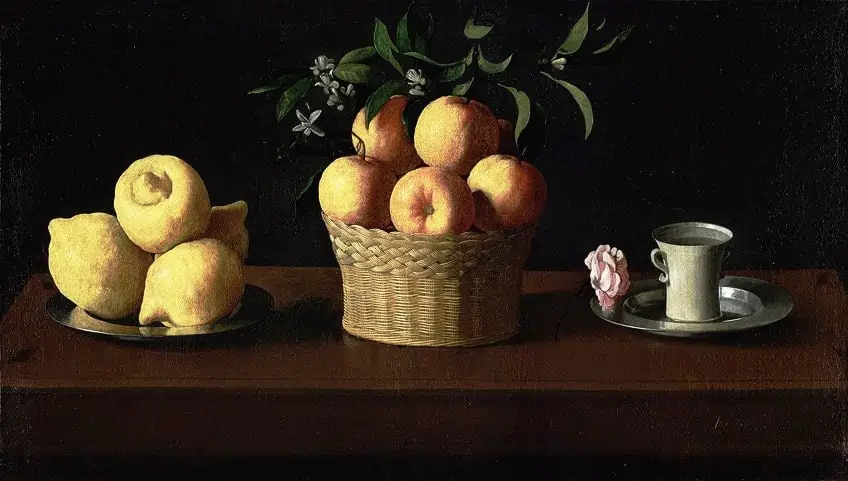
Even though the composition was intended to be a still life with no deeper significance, the traditional connotations of the various elements promote a symbolic interpretation. There is, nevertheless, no evidence to indicate that these symbolic correlations were planned by Zurbarán or recognized as such by his contemporary public.
Jar of Peaches (1866) by Claude Monet
| Artist | Claude Monet (1840 – 1926) |
| Date Completed | 1866 |
| Medium | Oil on canvas |
| Current Location | Galerie Neue Meister, Dresden, Germany |
French artist Claude Monet was a founder of the Impressionist movement, however, some of his earlier work also received significant notice. This fruit painting is widely regarded as one of his most underappreciated works, displaying a wide vast array of skills from the young artist. It is a well-known painting that displays a jar of preserved peaches casting a distinctive reflection on a marble slab and was completed in 1866. The skill of Monet to depict the jar’s reflection on the stone is what truly distinguishes this artwork as a masterpiece.
The artist eventually painted a number of natural paintings focusing on vistas and flowers, but this piece is an outstanding example of his earlier work.
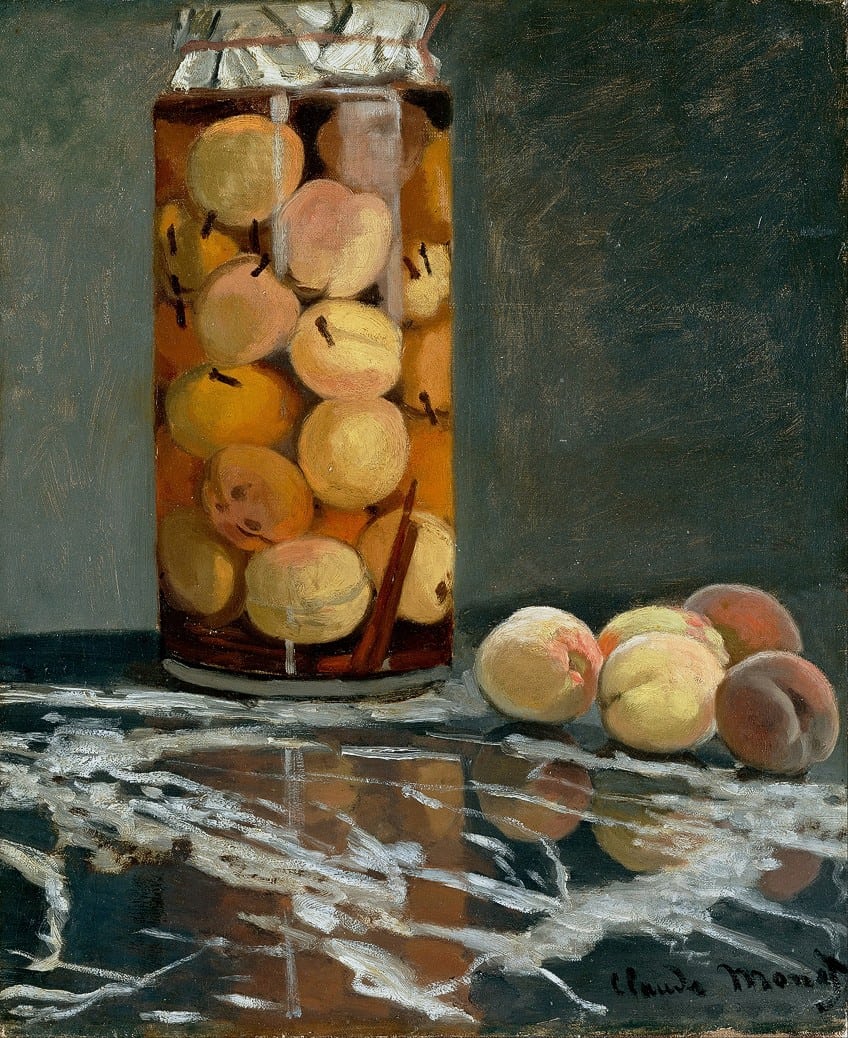
Still Life with Apples and Pitcher (1872) by Camille Pissarro
| Artist | Camille Pissaro (1830 – 1903) |
| Date Completed | 1872 |
| Medium | Oil on canvas |
| Current Location | Metropolitan Museum of Art, New York City, United States |
Unlike Renoir, Monet, Cézanne, and other artists in his group, Pissarro painted just a few still-lifes, most of which were completed late in his career. This 1872 painting is notable for its theme, as well as its finely articulated shapes and clever use of light.
There is just one other related artwork by the painter, Apples, and Pears in a Round Basket (1872), which is the same scale and context as this painting, with a matching floral-patterned wallpaper design.
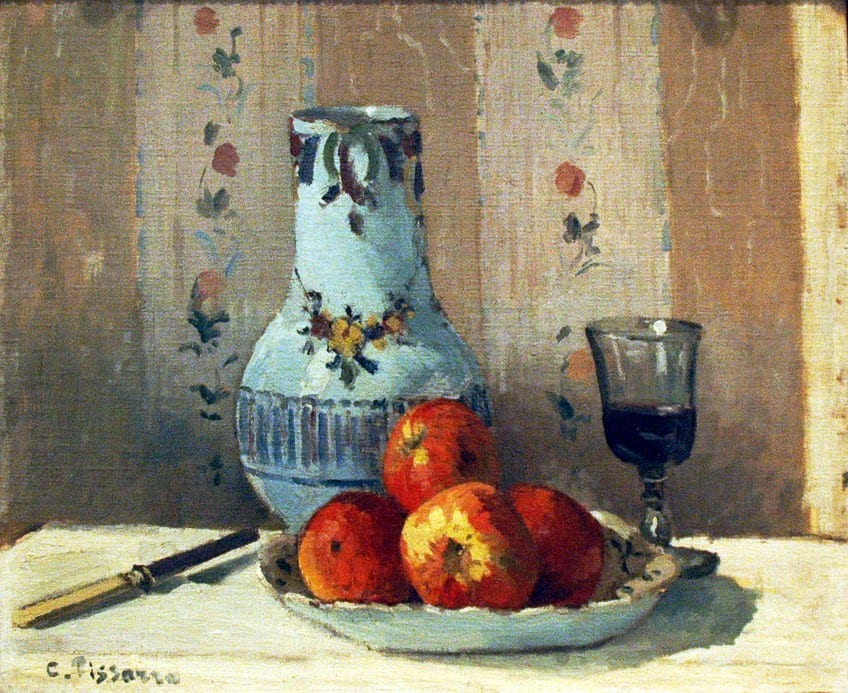
The artwork depicts a beautiful yet simple image of apples on a plate with a glass and a pitcher. The natural lighting captured by Pissarro in this artwork is a key component that makes it one of the most outstanding paintings of fruit ever created and is primarily what the piece is known for.
Fruit Displayed on a Stand (1881) by Gustav Caillebotte
| Artist | Gustav Caillebotte (1848 – 1894) |
| Date Completed | 1881 |
| Medium | Oil on canvas |
| Current Location | Museum of Fine Arts, Boston, United States |
The picture was created for the artist’s friend, Albert Courtier. The artwork was commissioned by Courtier for his dining room and is produced in the impressionist style that characterized Caillebotte’s work. It is painted from a vantage position, like the majority of his paintings.
The viewer appears to be poised over a fruit stand, as though choosing what to purchase.
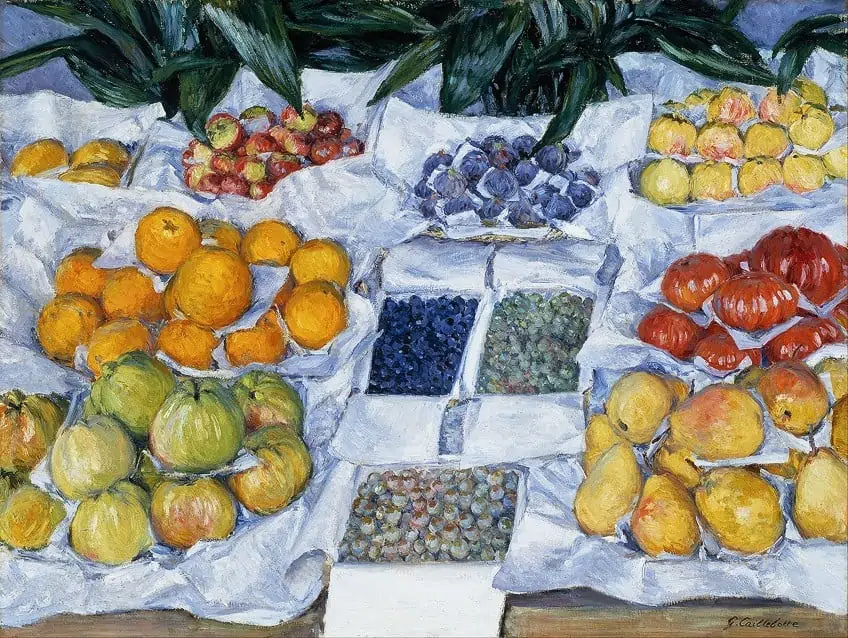
Caillebotte’s artwork features a wonderful arrangement of several fruits on a marketplace stall with balanced color contrast. It is a collection of various fruits such as oranges, apples, and pears, and each sort of fruit is grouped in its cluster, giving the display a feeling of organization.
The fruits have a variety of colors that work nicely together to produce a distinct harmony.
Still Life with Apples, Pears, Lemons, and Grapes (1887) by Vincent van Gogh
| Artist | Vincent van Gogh (1853 – 1890) |
| Date Completed | 1887 |
| Medium | Oil on canvas |
| Current Location | Art Institute of Chicago, Chicago, United States |
Van Gogh was regarded as a virtuoso of still-life paintings. His ability to depict natural trees, plants, and other items, especially fruits, is unparalleled in art history. This artwork is likely one of the most renowned paintings of fruit ever made since it depicts a variety of fruit that has been ingeniously arranged on a tablecloth.
The artwork is well-known for being one in which the artist began to explore with larger brushstrokes and complimentary color combinations.
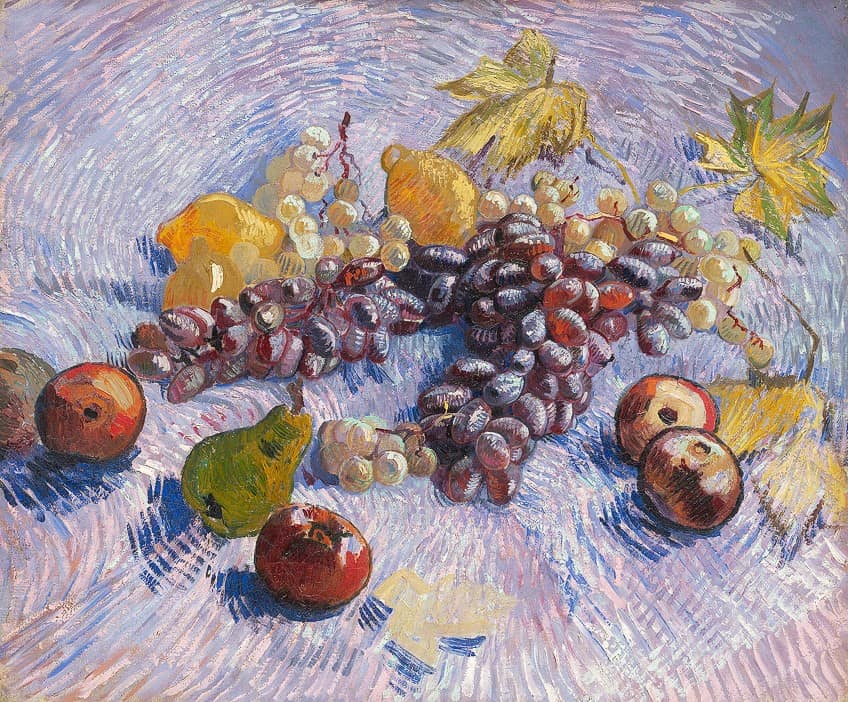
A neatly-arranged display of pears and apples that garnish the table and surround the juicy grapes that stretch over the middle of the piece represents the variety of colors. The lighter green hues of the foliage provide a wonderful contrast to the rich crimson and purple shades of the plums and apples in the artwork’s lower third. The strange pulsing style in which Van Gogh portrayed the fruits and tablecloth is most likely one of the pieces he labeled as “violent still lifes.”
This artwork was created in 1887 as part of a sequence of works dedicated to fruits by the painter.
The Meal (1891) by Paul Gauguin
| Artist | Paul Gauguin (1848 – 1903) |
| Date Completed | 1891 |
| Medium | Oil on canvas |
| Current Location | Musée d’Orsay, Paris, France |
Paul Gauguin produced this artwork in the first few months after he arrived in Tahiti. Despite his intention to capture the island’s life, his early paintings are fictional. This is not a genuine dinner, but a scenario divided into two registers: a still-life in the front that supports the painting’s title, and a girl and two boys seated in a row in the rear. The still life’s dimensions are astounding.
With the large fruit verging on vermilion and the purple shadows projected on the tablecloth, the bunch of bananas takes up about a fourth of the composition.
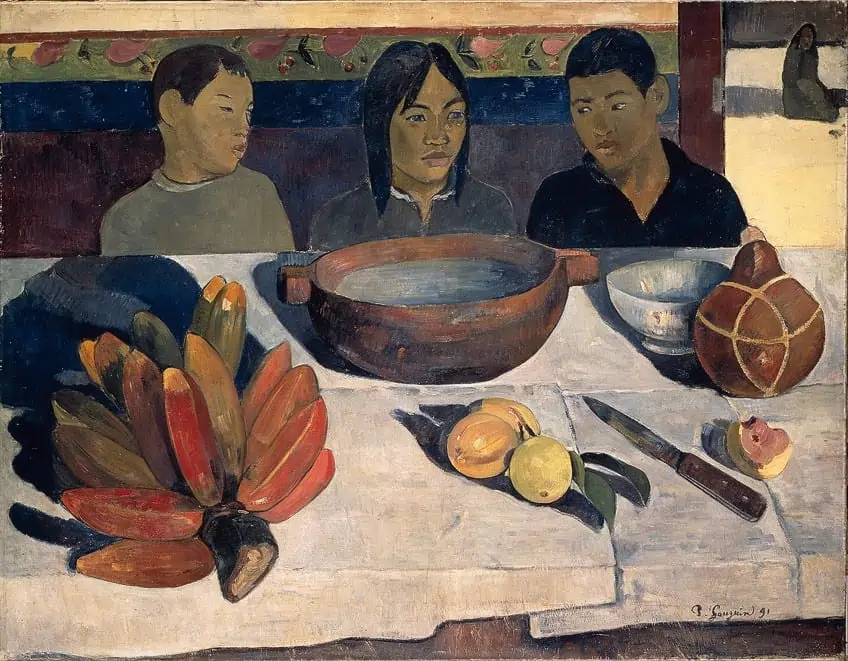
The carved wooden dish, which contains coconut milk but is usually used for fish, is also rather large. This meticulously crafted still-life has little to do with a realistic mealtime, especially because eating at a table is not usually practiced in Tahiti.
Paul Gauguin has arranged these common objects for purely ornamental and exotic effects.
Young Woman Picking Fruit (1892) by Mary Cassatt
| Artist | Mary Cassatt (1844 – 1926) |
| Date Completed | 1892 |
| Medium | Oil on canvas |
| Current Location | Carnegie Museum of Art, Pennsylvania, United States |
Between 1891 and 1893, Cassatt was particularly interested in the subject of women picking fruit, which had previously been explored by Degas, Courbet, Morisot, Pissarro, and Renoir. Mary Cassatt produced it for the 1893 Women’s Building at the Chicago World’s Columbian Exposition. It depicts two women – one reaching for a piece of fruit and the other seated contemplatively with a fruit in her lap.
The artist believes that the pear tree symbolizes the tree of knowledge, and these contemporary women communicate their wish for equality and academic recognition by taking the fruit from the tree.
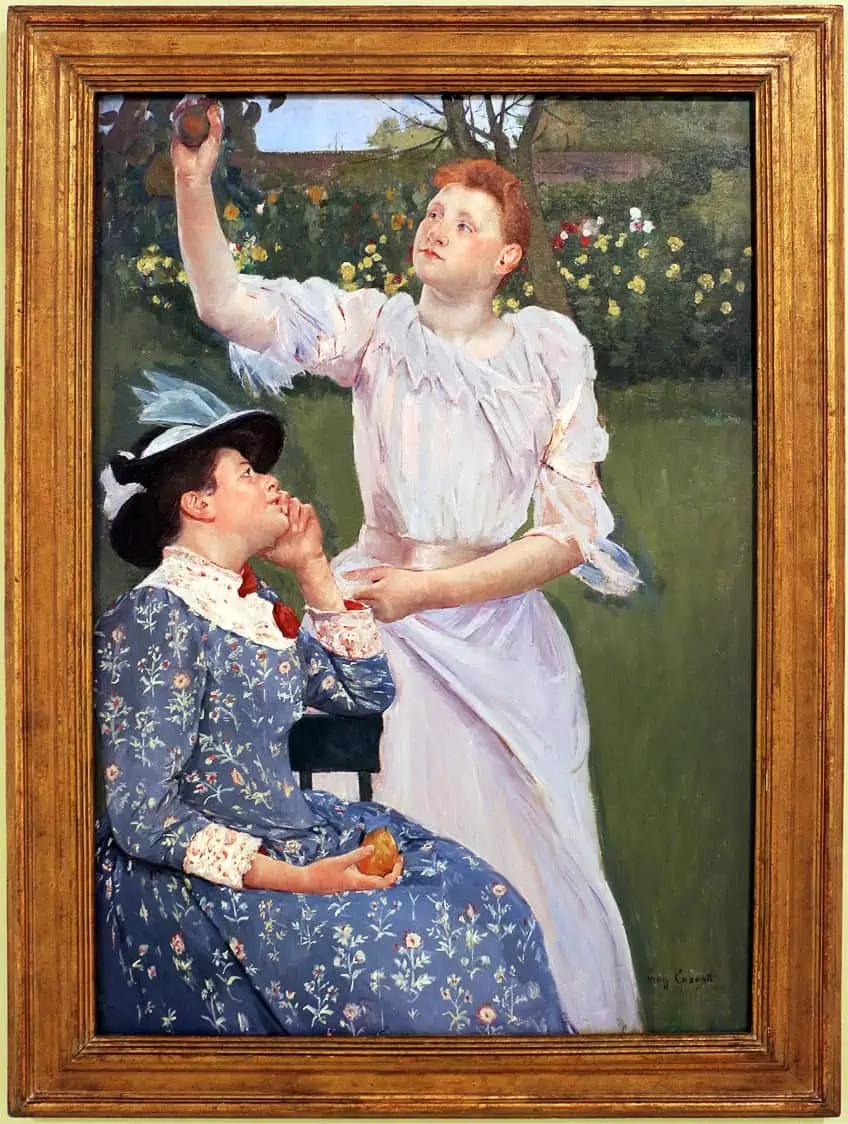
Basket of Apples (1895) by Paul Cézanne
| Artist | Paul Cézanne (1839 – 1906) |
| Date Completed | 1895 |
| Medium | Oil on canvas |
| Current Location | Art Institute of Chicago, Chicago, United States |
The artist meticulously organized every detail in this artwork. The wine bottle situated at the top, which fits centrally on the tabletop, provides a vertical equilibrium to the whole piece. Table linen drapes over the side in front of us, with numerous pieces of fruit preventing it from fully dropping off. A big basket sags, enabling numerous apples and oranges to fall upon the table.
A little porcelain dish with bread is placed in the right corner to complete the arrangement.
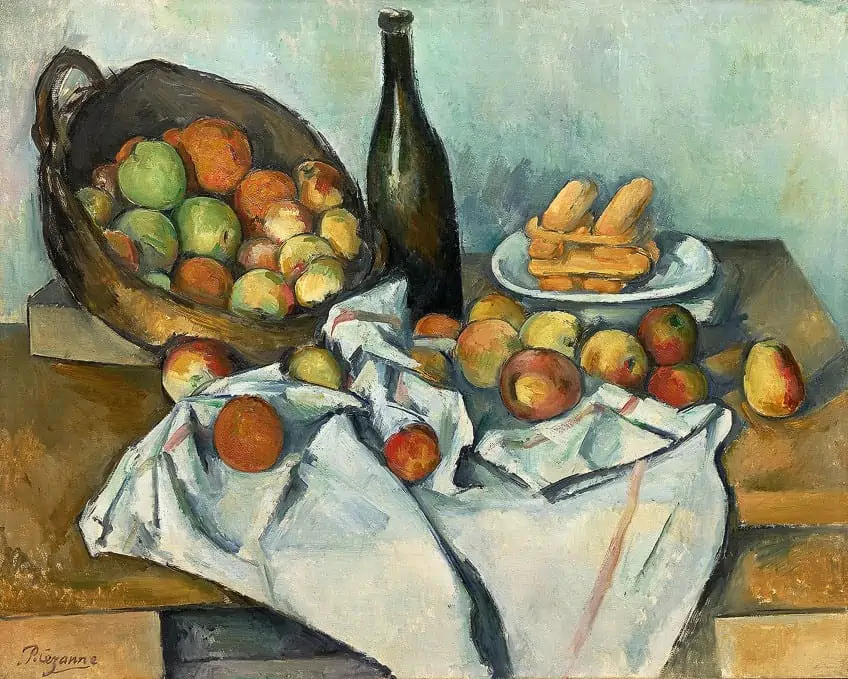
The artist opted to sign this painting to express his pleasure with its completion, which was quite rare for him to do. Everything is precisely arranged across the tabletop, with the table linen flowing in one direction and the basket alternating in the opposing direction.
This modification of angles that the artist observed created the framework for the Cubism movement which subsequently emerged.
Pomegranates (1908) by John Singer Sargent
| Artist | John Singer Sargent (1856 – 1925) |
| Date Completed | 1908 |
| Medium | Oil on canvas |
| Current Location | Brooklyn Museum, New York City, United States |
John Singer Sargent was a highly renowned Italian-American painter whose compositions and realism was widely regarded as practically photorealistic. Pomegranates, motivated by the lush greenery on the island of Majorca, depict the fruits in close-up view, with the fruit seeming to burst out of the panting with its crimson seeds amid deep green foliage.
Sargent eliminated any spatial reference points (ground or sky) and stretched the textures and colors to the canvas’s edge, emphasizing the composition’s ornamental two-dimensionality.
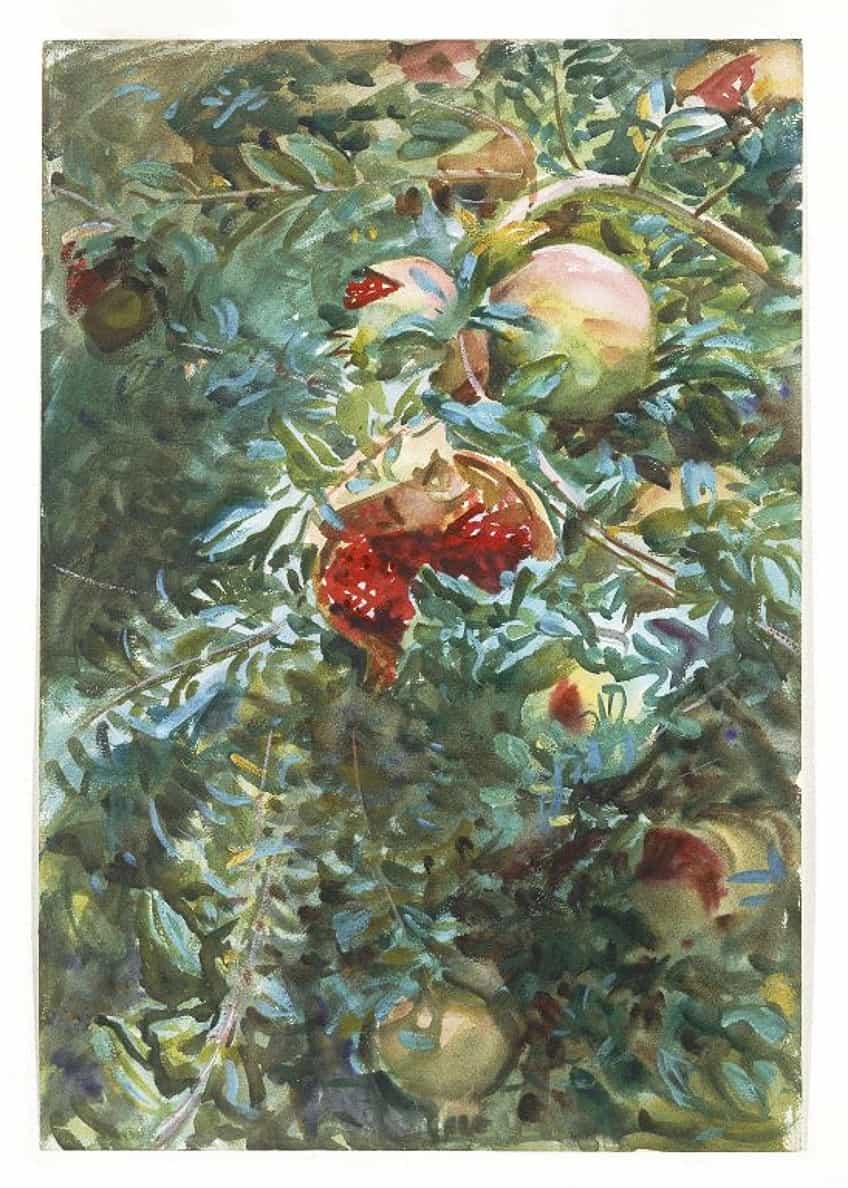
In other areas, his aggressive, expressive brushwork overpowers objective shapes, implying that he was pushing the limits of modernist abstraction with this work. The famous artwork is currently housed in a private collection and is 73 by 56 centimeters in size.
As we have discovered today, many of the world’s most renowned artists have all had a go at creating fruit still-life paintings in their lifetimes. Thanks to their efforts, we have many famous fruit paintings to enjoy today. No matter whether they have been rendered in a realistic, impressionist, or even cubist, style, paintings of fruit were a vibrant and natural choice of theme for artists to play around with.
Take a look at our most famous fruit paintings webstory here!
Frequently Asked Questions
Why Did Artists Produce Paintings of Fruit?
There are several reasons that artists choose to portray fruit. For one, they are vibrant and colorful, and come in a variety of shapes, meaning that artists can explore many colors are potential interesting angles. Fruit is also very symbolic, and can be used to represent a certain message within the artwork. It is also a theme that can fit into a multitude of locations without seeming out of place, whether it be in a gallery or simply one’s living room area.
Which Artists Created Fruit Still-Life Paintings?
Many prominent artists have tried their hand at producing paintings of fruit. These include Claude Monet, Vincent van Gogh, Paul Gauguin, John Singer Sargent, and Caravaggio. However, probably the most well-known artwork that contains fruit is the work of the artist, Giuseppe Arcimboldo. He is most well-known for creating creatively inspired portraits of people that are rendered completely from various pieces of fruit and vegetables that have been painted to look like actual people from his life.
Jordan Anthony is a Cape Town-based film photographer, curator, and arts writer. She holds a Bachelor of Art in Fine Arts from the University of the Witwatersrand, Johannesburg, where she explored themes like healing, identity, dreams, and intuitive creation in her Contemporary art practice. Jordan has collaborated with various local art institutions, including the KZNSA Gallery in Durban, the Turbine Art Fair, and the Wits Art Museum. Her photography focuses on abstract color manipulations, portraiture, candid shots, and urban landscapes. She’s intrigued by philosophy, memory, and esotericism, drawing inspiration from Surrealism, Fluxus, and ancient civilizations, as well as childhood influences and found objects. Jordan is working for artfilemagazine since 2022 and writes blog posts about art history and photography.
Learn more about Jordan Anthony and about us.
Cite this Article
Jordan, Anthony, “Famous Fruit Paintings – Take a Look at the Best Paintings of Fruit.” artfilemagazine – Your Online Art Source. November 3, 2022. URL: https://artfilemagazine.com/famous-fruit-paintings/
Anthony, J. (2022, 3 November). Famous Fruit Paintings – Take a Look at the Best Paintings of Fruit. artfilemagazine – Your Online Art Source. https://artfilemagazine.com/famous-fruit-paintings/
Anthony, Jordan. “Famous Fruit Paintings – Take a Look at the Best Paintings of Fruit.” artfilemagazine – Your Online Art Source, November 3, 2022. https://artfilemagazine.com/famous-fruit-paintings/.


